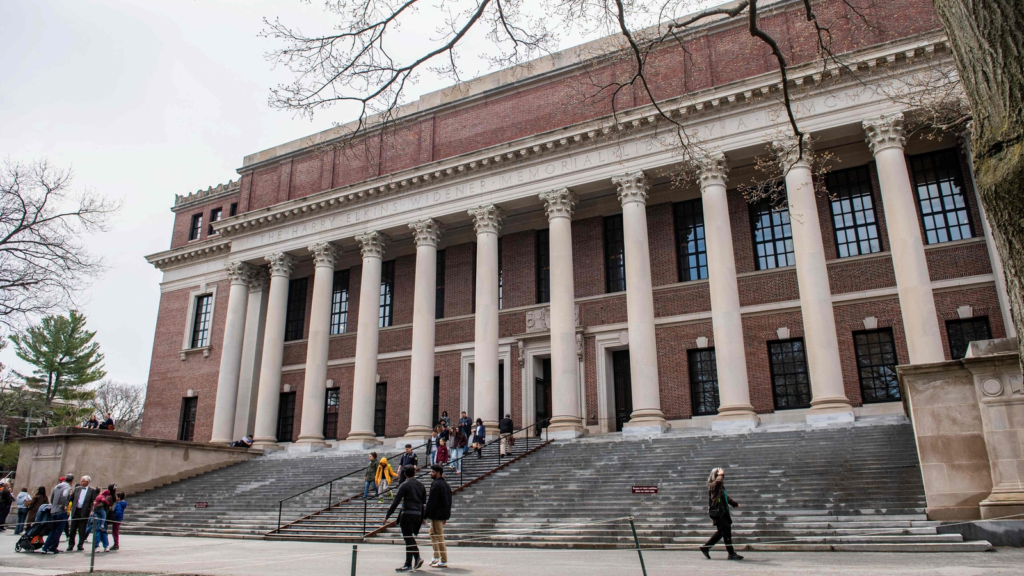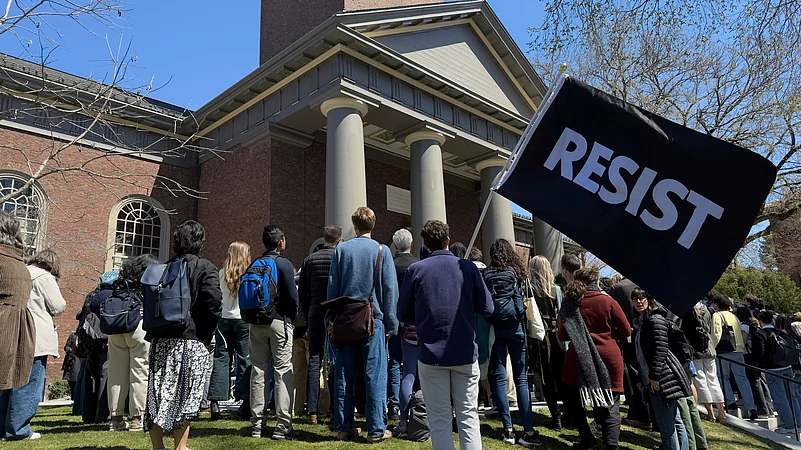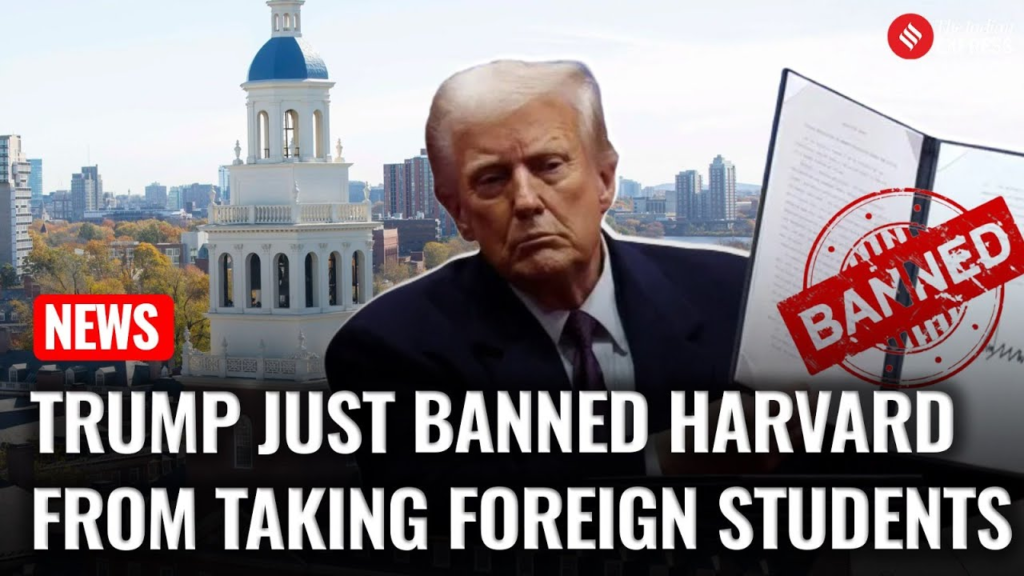In a stunning move that has sent shockwaves through the academic world, the Trump administration announced on May 22, 2025, that Harvard University, one of the most prestigious institutions in the United States, can no longer enroll international students. The decision, spearheaded by the Department of Homeland Security (DHS) under Secretary Kristi Noem, revokes Harvard’s certification in the Student and Exchange Visitor Program (SEVP), effectively barring the university from sponsoring visas for foreign students. This unprecedented action has left nearly 7,000 international students—about 27% of Harvard’s total enrollment—facing an uncertain future, with current students ordered to transfer to other schools or risk losing their legal status in the U.S.

The announcement marks a dramatic escalation in the ongoing feud between the Trump administration and Harvard, a conflict that has been brewing for months over issues like campus protests, antisemitism allegations, and diversity policies. The decision has sparked fierce criticism from students, faculty, and higher education leaders, who call it retaliatory and unlawful. At the same time, it has ignited a broader debate about the role of international students in American universities and the political motivations behind the administration’s crackdown.
Why Did This Happen?
The Trump administration’s decision stems from a combination of ideological and political grievances with Harvard. According to a letter from Secretary Noem, the DHS revoked Harvard’s SEVP certification due to the university’s alleged failure to address “an unsafe campus environment” that fosters antisemitism, supports pro-Hamas sentiments, and promotes “racist” diversity, equity, and inclusion (DEI) initiatives. Noem also accused Harvard, without providing evidence, of coordinating with the Chinese Communist Party, a claim the university has vehemently denied.
The conflict began intensifying in early 2025, when the administration demanded that Harvard turn over detailed records about international students involved in “misconduct and other offenses.” Harvard’s refusal to comply with what it called an “unlawful” and overly broad records request prompted the DHS to follow through on its threat to decertify the university. This move comes on the heels of other punitive actions, including the freezing of $2.7 billion in federal funding for Harvard and threats to revoke its tax-exempt status.

The administration’s rhetoric paints Harvard as a hub of anti-American sentiment, with Noem stating on social media, “It is a privilege, not a right, for universities to enroll foreign students and benefit from their higher tuition payments to pad their multibillion-dollar endowments.” This sentiment reflects a broader campaign by the Trump administration to reshape American higher education, particularly targeting elite institutions accused of liberal bias.
The Impact on Students
For the nearly 7,000 international students at Harvard, the decision is nothing short of devastating. These students, who hail from over 140 countries, now face the daunting prospect of transferring to other institutions or leaving the U.S. entirely. With many university admissions deadlines already passed, finding a new school is a logistical nightmare. “Everything I’ve worked so hard for, is it just going to fall apart?” asked Karl Molden, a sophomore from Austria, in an interview with the Boston Globe. “Everything is so uncertain.”
Leo Gerdén, a Swedish student set to graduate next week, called the policy “devastating” in the Harvard Crimson, urging the university to use its legal resources and political influence to fight the decision. “This should be priority number one,” he said. Another student from Canada, speaking anonymously to NPR out of fear of retaliation, expressed anxiety about graduating in a week under such uncertainty. “This does a lot more than threaten our education. It makes us feel like outsiders at Harvard, when it’s actually the opposite.”

The loss of international students could also reshape Harvard’s identity and finances. International students, who often pay full tuition, are a significant revenue source for the university, which has an endowment exceeding $50 billion. Beyond economics, their diverse perspectives enrich the academic environment. “Without international students, Harvard is simply not Harvard anymore,” Gerdén told the BBC.
Harvard’s Response and Legal Challenges
Harvard has denounced the Trump administration’s actions as “unlawful” and “retaliatory,” vowing to fight for its international students. In a statement, university spokesperson Jason Newton emphasized Harvard’s commitment to hosting students and scholars from around the world, saying they “enrich the University – and this nation – immeasurably.” The university has already faced significant financial blows, including the loss of $450 million in federal grants, but it remains defiant, arguing that the administration’s demands violate academic freedom and legal procedures.
Legal challenges are already underway. On the same day as the DHS announcement, a federal judge in California issued a preliminary injunction blocking the Trump administration from terminating the legal status of international students nationwide while related lawsuits are resolved. The ruling, issued by U.S. District Judge Jeffrey White, prevents the administration from arresting or deporting students based on their immigration status until proper regulatory procedures are followed. While this injunction does not directly address Harvard’s situation, it signals potential vulnerabilities in the administration’s approach, and Harvard is likely to pursue its own legal action.
Broader Implications for U.S. Higher Education
The Trump administration’s move against Harvard is part of a larger campaign targeting elite universities. In March 2025, the administration slashed $400 million in funding to Columbia University over similar allegations of antisemitism and inadequate responses to campus protests. Other institutions face scrutiny as well, with Noem warning that Harvard’s decertification should “serve as a warning to all universities and academic institutions across the country.”
Critics argue that the policy undermines the U.S.’s position as a global leader in higher education. International students contribute significantly to the economy, spending money on tuition, housing, and local businesses. “These students are a key part of why the U.S. remains a world center for academic success,” said Leo Gerdén in an interview with CNA. The decision could deter future students from choosing American universities, potentially weakening the nation’s academic and economic influence.
Supporters of the administration, however, see the move as a necessary step to hold universities accountable. Posts on X reflect this sentiment, with some users praising the crackdown as a way to curb perceived anti-Americanism and protect national interests. “Harvard is trying to protect Hamas supporters. Trump is trying to deport them,” wrote one user, echoing the administration’s narrative.
What Happens Next?
The future remains uncertain for Harvard’s international students and the university itself. Harvard could challenge the DHS decision in court, leveraging its substantial resources to argue that the revocation is illegal. However, with the administration signaling plans to expand the crackdown to other institutions, the stakes are high for the entire higher education sector.
For students like Molden and Gerdén, the immediate focus is on navigating an uncertain academic and legal landscape. Some are exploring transfer options, while others hope Harvard’s legal efforts will reverse the decision. The university’s next steps—whether defiance, negotiation, or compliance—will shape not only its own future but also the broader conversation about academic freedom, immigration, and the role of politics in education.
As this story unfolds, it’s clear that the Trump administration’s actions have struck a nerve, raising questions about fairness, legality, and the values that define American higher education. For now, thousands of students are caught in the crossfire, their dreams of a Harvard education hanging in the balance.
Also Read :- DTF Printers Are Transforming Small Businesses in the USA: What You Need to Know in 2025






